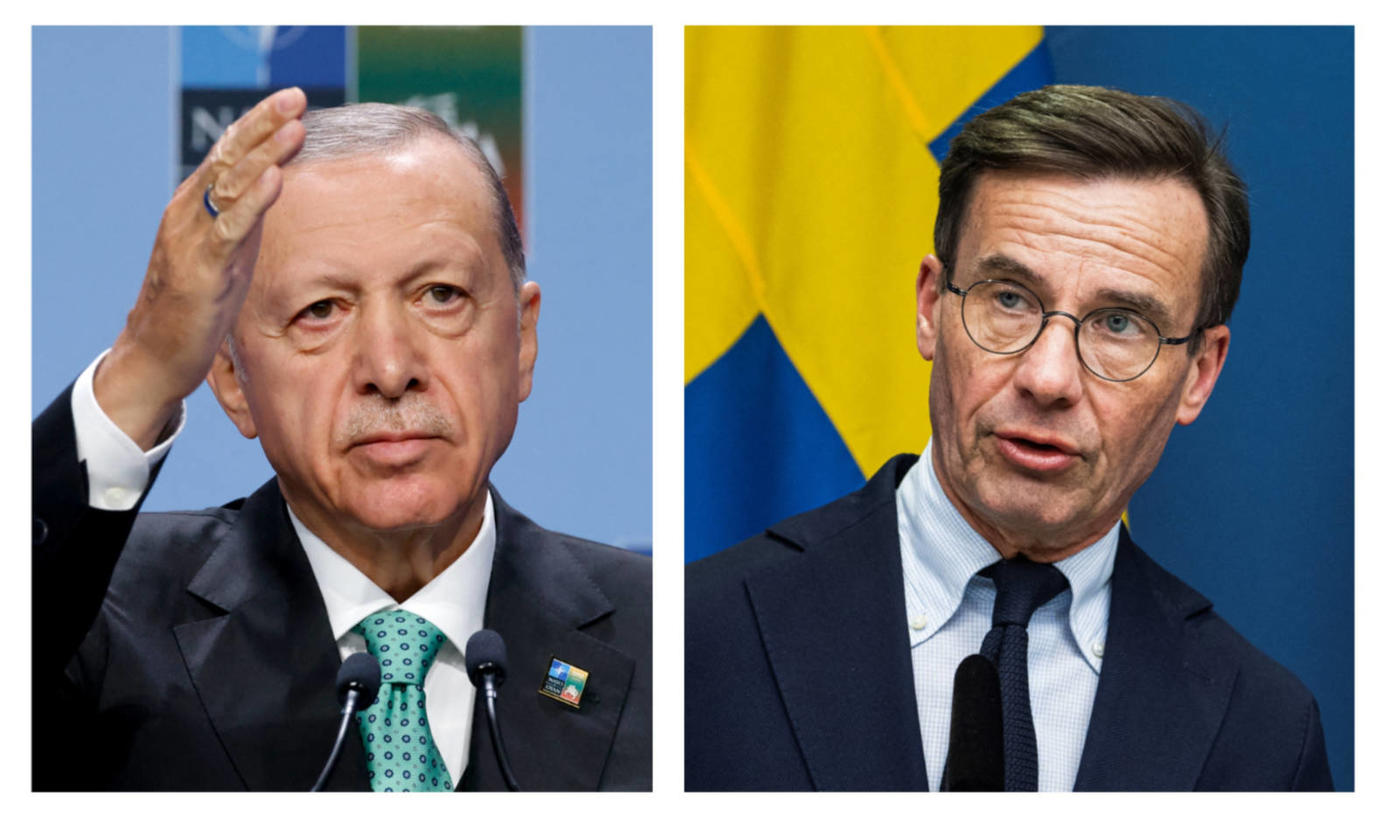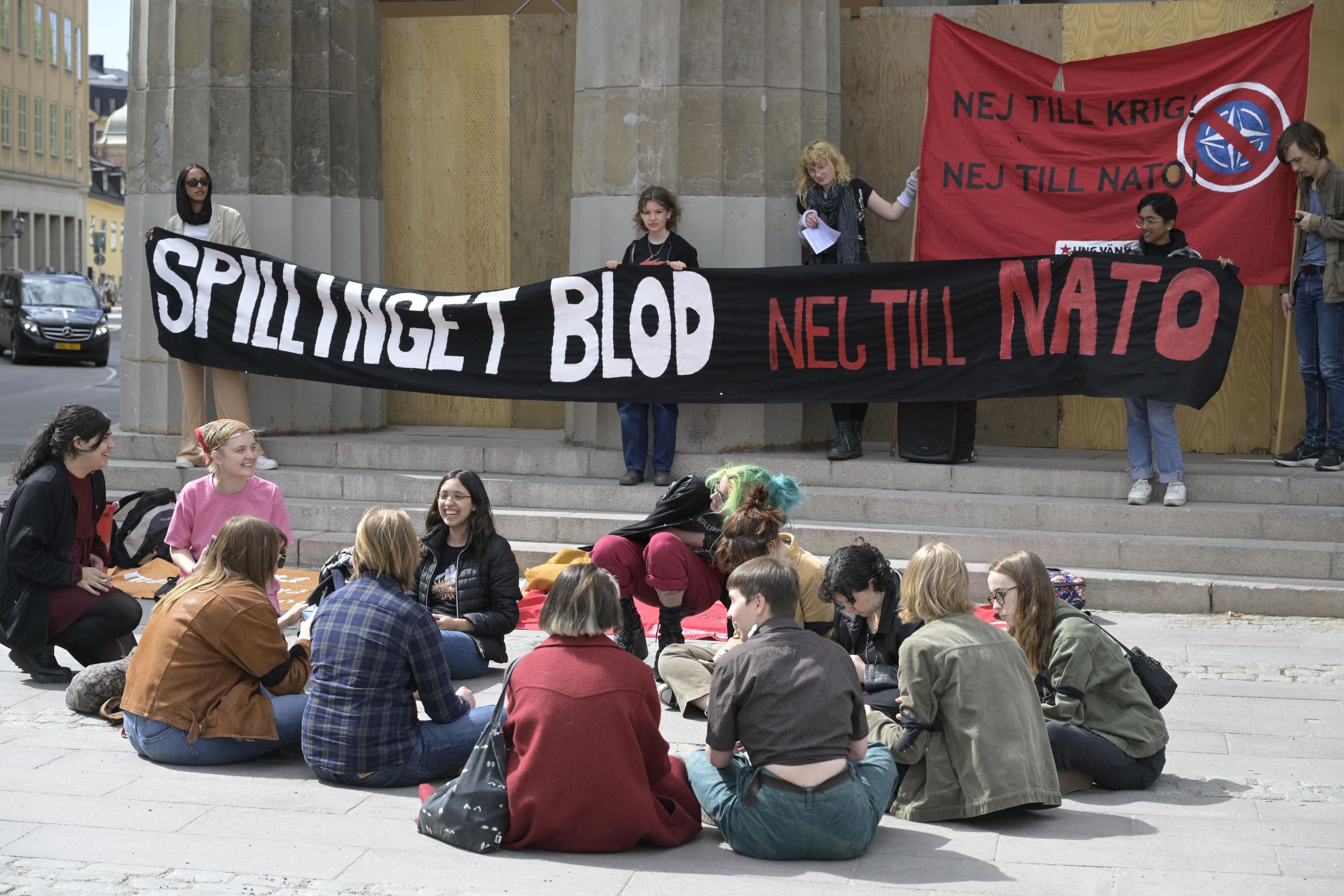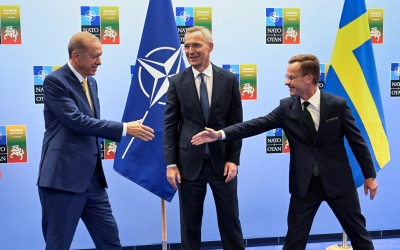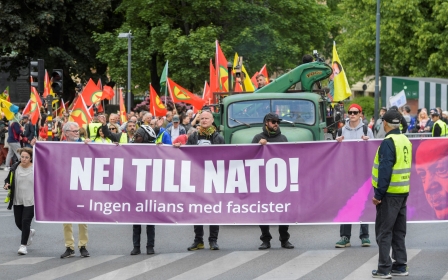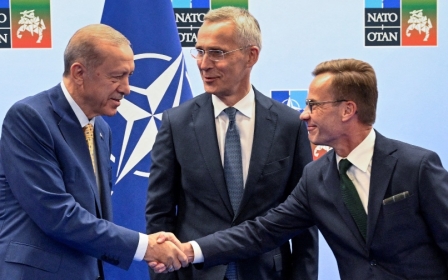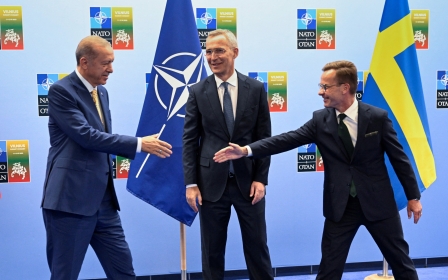Sweden and Nato: Has Stockholm appeased Turkey too much?
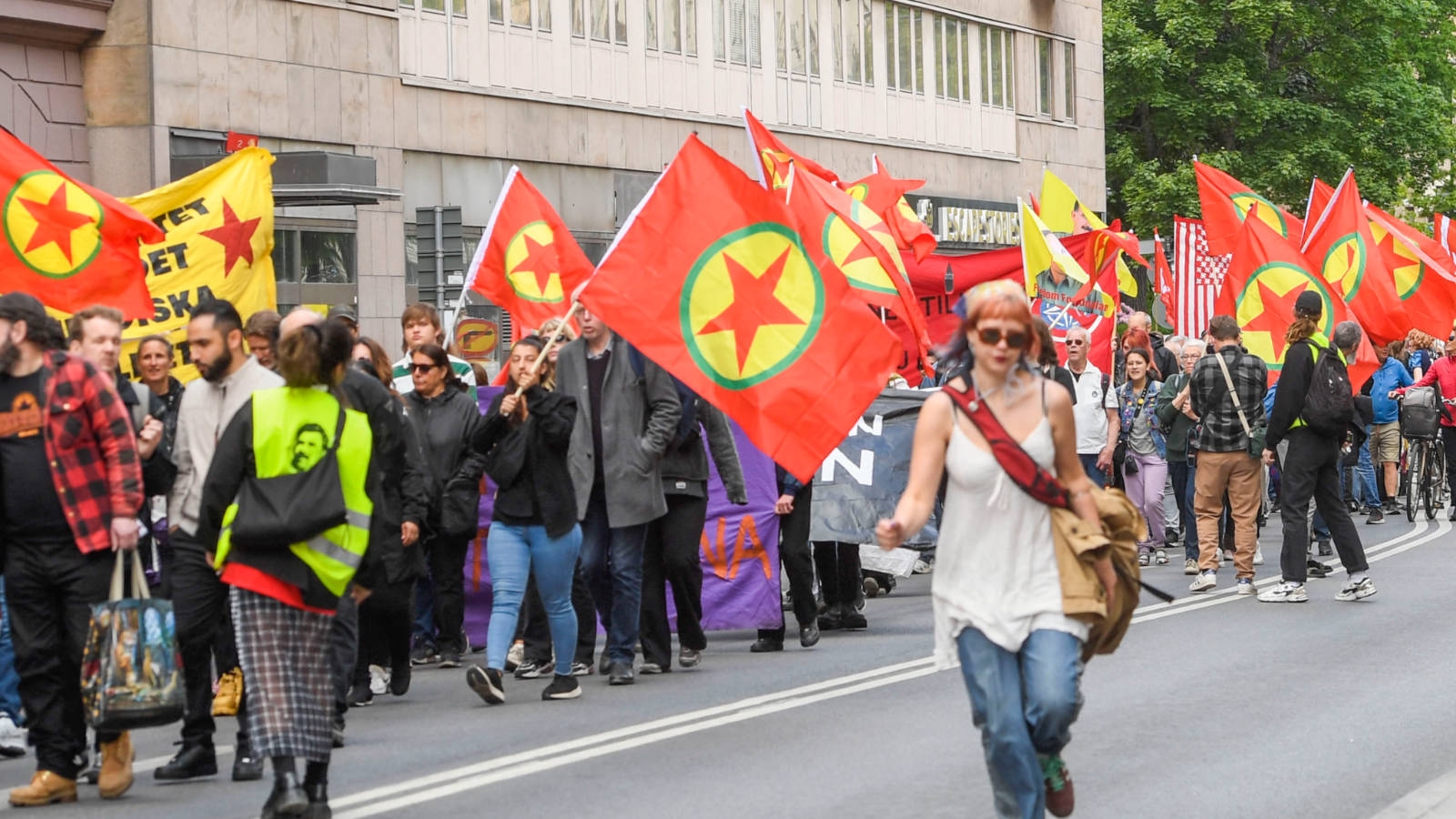
Sweden has not been at war internationally since 1814, the longest period of peace for any European nation. During the Cold War, Stockholm remained neutral, becoming a haven for dissidents and an interlocutor between the great powers.
Although this shifted partially in 1995 when Sweden joined the EU, its continuing resistance to joining Nato was a pillar of its non-aligned status.
No longer, it seems.
Since Russia's invasion of Ukraine in February 2022, there has been a push both inside and outside Sweden for the nation to become a member of the world's most powerful military alliance, due to fears of aggression by Moscow to the east as well as a desire to present a united European front.
Public opinion shows a majority - if not an absolute majority - of Swedes back Nato membership. In March, the Riksdag, Sweden's 349-seat parliament authorised the country's assession in a 269-37 vote, with 43 abstentions.
New MEE newsletter: Jerusalem Dispatch
Sign up to get the latest insights and analysis on Israel-Palestine, alongside Turkey Unpacked and other MEE newsletters
But not everyone in the country is happy, including those concerned by Sweden's moves to appease current Nato member Turkey in order for the country to lift its veto.
In the Swedish parliament, the Green Party and the Left Party are leading opposition to membership, while anti-war and pro-Kurdish organisations have led "No to Nato" street demonstrations.
Jacob Risberg, foreign policy spokesperson for the Green Party, explained: "The biggest reason of course is that Nato is based on nuclear deterrent. That is our main reason, we don’t believe that a nuclear deterrent is a good option."
He told MEE that Sweden has a history of being an "independent, alliance-free voice in the world", and that it would be tragic to lose that status.
For a country that has prided itself on funneling public money into a comprehensive welfare state, Nato membership will mean committing a minimum of two percent of GDP to defence spending, up from one percent in 2018.
Hakan Svenneling, foreign policy spokesperson for the Left Party, called the move the biggest shift in Swedish politics in generations.
"We think Sweden joining a big military alliance could draw Sweden into other countries' conflicts," he told MEE. "It’s going to shift Swedish policy after 200 years… it's going to have an impact on Sweden’s domestic policies for a long time."
Two centuries of peace
For better or worse, Sweden's neutrality has long defined it.
The party most responsible for ensuring this has been the Social Democrats (SDP). In power longer than any other party in Sweden over the past 100 years, it has maintained the country's separation from the Nato military alliance, even at the height of the Cold War, as well as fostering the country's heavily-unionised economy and famously high living standards.
'The shift last year was very quick, there was really no debate'
- Hakan Svenneling, Left Party
Even after the 2022 Russian invasion of Ukraine, the party was initially hesitant to abandon its longstanding anti-Nato policy, unlike right-wing parties who had long supported the principle.
But eventually, several factors made the SDP shift their position.
"The Russian aggression on Ukraine was the main reason, but Finland switching sides, then also that we had an election in the fall last year," said Risberg.
He also added that the SDP had been opportunistic.
"I don’t think you would have won last year's election by being anti-Nato," he said, referring to the October 2022 elections which - despite their pro-Nato stance - saw the SDP ousted from power.
Even now, SDP support for Nato has not been universal, and many party supporters are still sceptical.
Annika Strandhall, head of the party's women’s wing said in May 2022 that her section would continue to oppose Nato membership, backing Sweden's "long history and struggle in matters concerning peace, disarmament, detente and military freedom of alliance”.
Svenneling said: "The shift last year was very quick, there was really no debate when the two biggest parties shifted in just a couple of weeks."
Fear among Kurds
In early July, Turkish President Recep Tayyip Erdogan seemed to lift his objection to Sweden's membership of Nato. It now only needs to be approved by Hungary, which has also indicated support, and the Turkish parliament for it to be a done deal.
But while winning Turkish support for Sweden's Nato bid has been crucial to the process, many Swedes have been uncomfortable at the compromises Stockholm has had to make to appease Erdogan's demands.
Since Sweden began its application for Nato membership, the Swedish government lifted an arms embargo on Turkey that had been put in place following Ankara's invasion of Kurdish-controlled areas of Syria in 2019.
Stockholm also accelerated the passing of anti-terrorism legislation that makes it illegal to arrange meetings or provide logistical, financial help - or even food - to illegal groups.
These new laws have the potential to affect dissidents from Turkey, including supporters of the outlawed Kurdistan Workers Party (PKK), who have long made Sweden their home, with numbers rocketing in the wakes of Turkish military coups in 1971 and 1980.
There are thought to be over 100,000 Kurds and more than 150,000 Turks in Sweden, making up more than two percent of the population.
Turkey has repeatedly insisted that Sweden extradite dissidents and clamp down on protests by Kurdish and Turkish leftists on Sweden's streets.
Hakan Cifci is a member of the foreign relations committee of the Kurdistan National Congress (KNK) and spoke to MEE from Sweden.
Along with the Sweden-based Kurdish Democratic Society Center, he has joined "No to Nato" demonstrations across the country.
Photos of the protests, which feature PKK flags and images of group founder Abdullah Ocalan, have angered Erdogan and other Turkish politicians.
'They were clapping when Kurds were fighting against Islamic State. And where are you now? How can this suddenly change?'
- Hakan Cifci, Kurdish National Congress
"Kurds here are worried about how democracy in Sweden is under threat, something I also share. Not only Kurds but also many people who support Kurds or criticise Erdogan are also worried," Cifci said, highlighting a number of Kurdish dissidents who have been deported to Turkey during the past year.
Sweden's judiciary is considered independent. The Swedish government has also denied any connection between deportations and the Nato bid. But many are concerned as to how far the country is willing to go.
"That’s the goal for Erdogan – Sweden, and Finland, have often criticised Turkey’s lack of democracy and now they’re going to campaign for Turkey inside EU institutions," said Svenneling.
Turkey, he said, wanted to "silence Sweden's voice on democracy and human rights" and seek closer cooperation on intelligence issues. "Turkey wants that to lead to people being expelled from Sweden to Turkey," he added.
Cifci also said that nominally left-wing politicians who abandoned their longstanding opposition to Nato had "disappointed" their voters. "Even if they support [Nato membership], these voters do not accept that Kurds became a bargaining chip on the negotiations table," he said.
"They were clapping when Kurds were fighting against Islamic State. And where are you now? How can this suddenly change? Where is your political dignity?"
'Reasonable' demands
Erdogan has hinted that Sweden's application to join Nato could be sent to the Turkish parliament for approval in October.
Some have speculated on whether there could be a last-minute U-turn by Erdogan or his allies before then, perhaps to extract further demands. But otherwise, the indications are that Sweden will join Nato.
Jan Hallenberg, associate senior research adviser at the Swedish Institute of International Affairs, told MEE that the world had changed as a result of Russia's actions and the "minority" in Sweden opposed to Nato membership would need to accept that.
"The Swedish self-image during the Cold War was that there was a third way, there was the US and Soviet Union and Sweden was the third way - that will have to go."
Hallenberg also said that while it was "absurd" for Turkey, one of the "least democratic countries in Europe", to be making demands of Sweden, nevertheless some of them were "reasonable".
"I think Swedes have been too naïve about the PKK - even though they’ve been outlawed and branded a terrorist organisation, Sweden didn’t do anything to curb their activities. That is a legitimate demand."
But Hallenberg was concerned if Ankara's demands for deportations extended beyond the PKK to other groups it has asked Sweden to crack down on, including the People's Protection Units (YPG) or supporters of US-based cleric Fethullah Gulen, who the Turkish government has accused of instigating the 2016 coup against it.
Turkey's dissidents have long been sceptical of Nato as an institution. The country joined the alliance in 1952 under the government of Prime Minister Adnan Menderes, only for him to be overthrown and executed eight years later in a coup led by Nato-trained military officers.
During the 1990s, thousands of Kurdish villages were destroyed during the so-called "Dirty War" conducted by the Turkish state against the PKK, its allies, and suspected supporters. Part of the government campaign included Nato-trained deep state networks carrying out targeted assassinations, including against elected politicians.
Cifci said: "Nato supported its Nato member, Turkey, in conducting these operations. And this continues today.
"Why am I saying that? All those weapons being dropped in Kurdistan now are still weapons from Nato countries."
Middle East Eye delivers independent and unrivalled coverage and analysis of the Middle East, North Africa and beyond. To learn more about republishing this content and the associated fees, please fill out this form. More about MEE can be found here.


